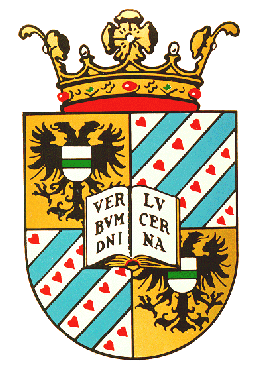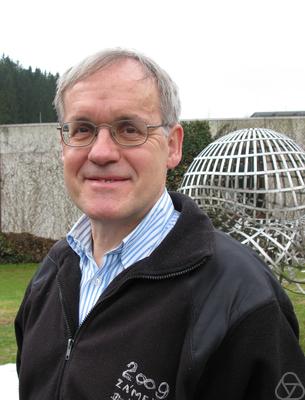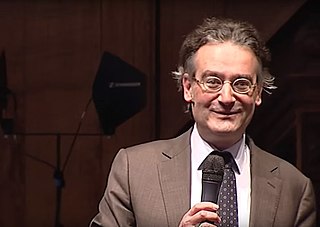The Eindhoven University of Technology, abbr. TU/e, is a public technical university in the Netherlands, situated in Eindhoven. In 2020–21, around 14,000 students were enrolled in its BSc and MSc programs and around 1350 students were enrolled in its PhD and EngD programs. In 2021, the TU/e employed around 3900 people.

Utrecht University is a public research university in Utrecht, Netherlands. Established 26 March 1636, it is one of the oldest universities in the Netherlands. In 2023, it had an enrollment of 39,769 students, and employed 8,929 faculty members and staff. More than 400 PhD degrees were awarded and 7,765 scientific articles were published. The university's 2023 budget was €2.8 billion, consisting of €1.157 billion for the university and €1.643 billion for the University Medical Centre Utrecht.

Simon Stevin, sometimes called Stevinus, was a Flemish mathematician, scientist and music theorist. He made various contributions in many areas of science and engineering, both theoretical and practical. He also translated various mathematical terms into Dutch, making it one of the few European languages in which the word for mathematics, wiskunde, was not a loanword from Greek but a calque via Latin. He also replaced the word chemie, the Dutch for chemistry, by scheikunde, made in analogy with wiskunde.

Leiden University is a public research university in Leiden, Netherlands. It was founded as a Protestant university in 1575 by William, Prince of Orange as the first university in the Netherlands.

The University of Groningen is a public research university of more than 30,000 students in the city of Groningen in the Netherlands. Founded in 1614, the university is the second oldest in the country.

The Royal Netherlands Academy of Arts and Sciences is an organization dedicated to the advancement of science and literature in the Netherlands. The academy is housed in the Trippenhuis in Amsterdam.

Carlo Willem Joannes Beenakker is a professor at Leiden University and leader of the university's mesoscopic physics group, established in 1992.

Hendrik Pieter (Henk) Barendregt is a Dutch logician, known for his work in lambda calculus and type theory.

The Dutch Research Council is the national research council of the Netherlands. NWO funds thousands of top researchers at universities and institutes and steers the course of Dutch science by means of subsidies and research programmes. NWO promotes quality and innovation in science. NWO is an independent administrative body under the auspices of the Dutch Ministry of Education, Culture and Science.

Alexander (Lex) Schrijver is a Dutch mathematician and computer scientist, a professor of discrete mathematics and optimization at the University of Amsterdam and a fellow at the Centrum Wiskunde & Informatica in Amsterdam. Since 1993 he has been co-editor in chief of the journal Combinatorica.

Piet Gros is a Dutch chemist and professor biomacromolecular crystallography at Utrecht University. In 2010 he received the NWO Spinoza Prize for the elucidation of the three-dimensional structure of the C3 protein, which plays a central role in the complement system and contributes to innate immunity.
The Bijvoet Centre for Biomolecular Research is a research institute at Utrecht University. The Bijvoet Centre performs research on the relation between the structure and function of biomolecules, including proteins and lipids, which play a role in biological processes such as regulation, interaction and recognition. The Bijvoet Centre houses advanced infrastructures for the analysis of proteins and other biomolecules using NMR, X-ray crystallography, electron microscopy and mass spectrometry. The institute is named after famous Dutch chemist Johannes Martin Bijvoet, who worked at Utrecht University.

Albert van den Berg is a Dutch physicist who works on nanotechnology-miniaturization in physics, chemistry, biology and biotechnology.

Michel D. Ferrari is a Swiss neurologist and professor of neurology at Leiden University and Leiden University Medical Center. He was a winner of the 2009 Spinoza Prize. He is considered to be the foremost migraine expert of the Netherlands, as well as one of the six top scientist in the field worldwide.

Marten Scheffer is a Dutch ecologist, mathematical biologist and professor of Aquatic Ecology and Water Quality Management at Wageningen University and Research Centre. He was a winner of the 2009 Spinoza Prize. His research focuses on complex systems and their adaptability.

Balthassar Jozef Paul "Bas" van Bavel is a Dutch historian. He has held the chair of Transitions of Economy and Society at Utrecht University since 2011, and has been professor of Economic and Social History since 2007. His research has mostly focused on pre-industrial Northwestern Europe. He was one of the winners of the 2019 Spinoza Prize, the highest award in Dutch science.

Science and technology in the Netherlands has an extended history, producing many notable achievements and discoveries in the field. It is an important component in the economic and societal development of the Netherlands. The Dutch government is a driver of scientific and technological progress with science expenditure passing €4.5 billion every year.

Maria Petronella Gerarda Koopmans is a Dutch virologist who is Head of the Erasmus MC Department of Viroscience. Her research considers emerging infectious diseases, noroviruses and veterinary medicine. In 2018 she was awarded the Netherlands Organisation for Scientific Research (NWO) Stevin Prize. She serves on the scientific advisory group of the World Health Organization.

Wim van Saarloos is a Dutch physicist, academic and researcher. He is a Professor of Theoretical Physics at Leiden University

Linda Steg is a Dutch psychologist who is Professor of Environmental Psychology at the University of Groningen. She studies the interaction between people and their environment and how people influence their local ecosystems. She was awarded the 2020 Dutch Research Council Stevin Prize.

















